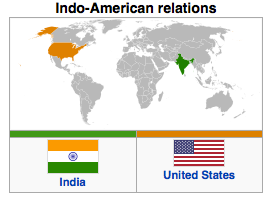China Dislikes India-US Military Cooperation – Analysis
By IDN
By Alicia Wong
Despite the unresolved border conflict, China and India have made “significant” progress in their bilateral relations. But U.S.-led multinational military collaborations in the region, including India, threaten to have “a complicated and in-depth influence”, according to a Chinese think-tank.
“In recent years, China and India’s cooperation has made significant achievements in various areas and both countries have maintained good coordination and cooperation in dealing with major international affairs, including border issues,” says Hu Zhiyong, associate professor at the Institute of Asia-Pacific Studies under the Shanghai Academy of Social Sciences.
An “edited and translated” version of the article, which first appeared in the Jiefang Daily of the Shanghai Committee of the Communist Party of China (CPC), was carried by People’s Daily Online on February 20. It was headlined “China, India should treat competition rationally”.
Hu, an expert on China-India relations, however cautions: “Of course, we must clearly realize that, despite the improvement of the bilateral relations in these years, the voices of fearing China, voices suspecting China and opposing China could still be heard in many places in India.”

Nevertheless, he add: “. . . these voices cannot change the mainstream viewpoint of India.” Because: “Far-sighted governmental officials of India propose to desert the Cold War mentality and rationally consider competition between China and India to promote the development of the China-India relations.”
Reiterating caution, he says: “The world has entered the second decade of the 21st century, and the development of the China-India relations is being tested by the United States’ strategic adjustment in the Asia-Pacific Region, which will have a complicated and in-depth influence on the future of China-India relations.”
Hu is referring to a “high-profile announcement” by the United States “to ‘return to the Asia-Pacific region’ in 2010.” Besides, Washington had hosted the first U.S.-Japan-India trilateral dialogue last year. “One of the main topics of the dialogue is on how to deal with China’s growing global military and political status. India’s participation put it into the ‘diplomatic network’ jointly established by the United States and Japan with the purpose of besieging China,” notes Hu.
The United States had introduced a new military strategy earlier in 2012, aiming to shift its military focus to the Asia-Pacific region. Subsequently, writes Hu, “U.S.-led multinational military cooperations, including U.S.-Australia-India cooperation and U.S.-Japan-India cooperation, have gradually become more institutionalized and normalized. The United States is now actively building a new Asia-Pacific strategic structure in favour of itself and accelerating its pace of strategic eastward.”
Without overtly urging India not to be a part of the U.S. strategy, Hu writes: “Both China and India are the world’s largest developing countries and emerging economies. The two countries have many common strategic interests, notwithstanding certain differences. China and India have similar views and common strategic needs in many aspects of international affairs, and share common understanding and value judgments in quite many fields. For example, both are unanimous in opposing unipolar world while supporting a multipolar world; both need a stable and peaceful environment for development and advocate establishing a harmonious surrounding environment.”
To this end, he adds, the possibility of China-India friendly cooperation is much greater than indulging in conflicts and war. “Therefore, China and India need to deal with bilateral relations from a strategic perspective and actively adopt pragmatic foreign policies based on mutual cooperation and strategic partnership to achieve a deeper and deeper Sino-Indian relationship. This will be conductive to create a mutual trust and benefit featured Asian security environment and deter penetration from foreign powers who attempt to interfere with Asian affairs.”
Significance of this article also lies in the fact that it has been published in run-up to the New Delhi summit meeting of the leaders of Brazil, Russia, India, China and South Africa (BRICS) on March 29, which will be the first major diplomatic event India will host in 2012.
The first summit of the grouping was held in 2009 in Russia, with the heads of government from Brazil, Russia, India and China (BRIC). The same four leaders met for the second summit in Brazil in 2010. In 2011, with China as the host, South Africa attended for the first time, adding an ‘S’ to BRIC.
The fourth summit at New Delhi is expected to focus on international terrorism, climate change and food and energy security. Prime Minister Manmohan Singh of India has pointed out that the BRICS countries share similar positions on many issues.
These include reform of the Bretton Woods institutions (IMF and the World Bank), trade protectionism and the Doha Development Round, achievement of the Millennium Development Goals, and support for a multi-polar, equitable and democratic world order. The prime minister stressed that against the backdrop of these global challenges, it is “all the more essential for BRICS countries to closely consult with each other.”

Where is the “analysis” written into the Headline? Just repeating other articles, which have already been read, is not analysis. Waste of my time.
In 2007 India refused to become part of the NATO alliance.
India’s best strategy is to follow the diplomacy of China and Turkey and be friends with everyone and trade with everyone. I have to say how much I admire both countries.
The Shanghai Cooperation Organisation should establish itself as being like the EU in that it is a trading block with a couple of main trading currencies, such as the Yuan, and it looks after the regions security from a cooperative and defensive not offensive perspective. India would be wise to become a ful member of this grouping as this will enhance its security with its neighbours including China.
William Hague has announced that he believes that there will be a Cold War with Iran and no doubt this will include the Bush mantra of ‘you are either with us or against us’ but India has gotten around this before by being part of the non-allign group which it can no doubt do again.